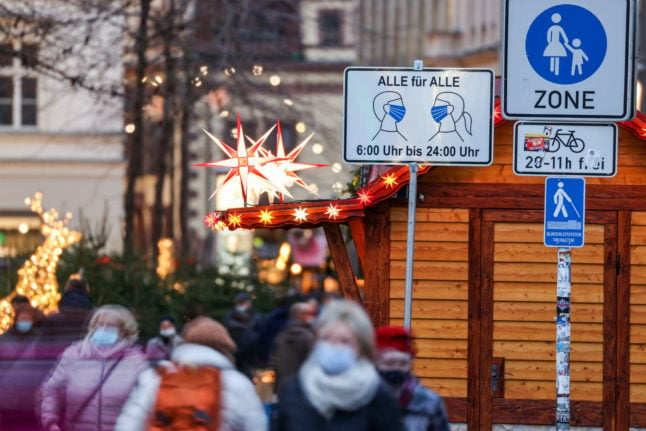Schools, childcare centres (Kitas) and non-essential shops will close in the state from Monday December 14th until at least January 10th.
It's the latest German state to enforce stricter rules as virus numbers continue to rise. There are increasing calls for Germany to enforce a nationwide lockdown in response to the worsening situation.
READ ALSO: Scientists plead for 'hard lockdown' in Germany as fears grow over Covid-19 spike at Christmas
In the last few days Saxony has become the largest hotspot in Germany.
Over the weekend the number of infections rose by 5,810 to 71,320. There have been 1,298 deaths connected to Covid-19 reported in the state so far.
Supermarkets and shops selling essential supplies such as pharmacies will not be affected by the closures. There are already tighter contact restrictions which mean people should only leave their homes for essential reasons.
Visits to elderly care homes will be tightly controlled, with negative tests and masks required.
“We have one of the toughest rules when it comes to initial restrictions, but it is not enough,” Kretschmer said on Tuesday while explaining why tougher measures were needed.
The situation in hospitals was not only tense but also extremely dangerous, he said. Around 20 to 30 percent of ICU beds were occupied by coronavirus patients, and patients from Upper Lusatia have to be transferred to Dresden or Leipzig.
“In some regions there are no intensive care beds any more,” Kretschmer said. The planned restrictions are the only way to stop the rise of infections.
Although the situation is worse than in spring, people are not taking the situation as seriously as they did then, Kretschmer said.
READ ALSO: Merkel says Germany 'won't get through winter' with current Covid-19 measures
According to the Robert Koch Institute, the districts of Bautzen (500.7) and the Saxon Switzerland-Eastern Ore Mountains (508) again exceeded the mark of 500 new infections per 100,000 inhabitants within seven days. Nationwide, only the district of Regen in Lower Bavaria had a higher incidence value of 578.7 on Tuesday.
For the whole of Saxony, the RKI reported a seven-day incidence of 319 on Tuesday, compared to 147 nationwide. Any city or district with more than 50 infections per 100,000 residents in seven days is considered a hotspot in Germany.
Meanwhile, 2,492 people are currently in hospital in Saxony with a Covid-19 diagnosis, 458 of them in intensive care.
What are other states doing?
Bavaria announced a lockdown from Wednesday, urging people to only leave their homes for essential reasons.
Schools will be asked to switch some lessons online for older age groups, while those in hotspots will need to move all teaching online for older students.
Meanwhile, the state of Thuringia does not plan to relax contact restrictions at Christmas.
The minority government has agreed to keep the restrictions as they are: a maximum of five people from two households (children not included).
The government and states decided to ease the rules for Germany over Christmas and New Year, allowing up to 10 people from any number of households to meet.
The move is not set in stone yet, though: the state parliament and local authorities are to be involved in the final decision.



 Please whitelist us to continue reading.
Please whitelist us to continue reading.
Member comments